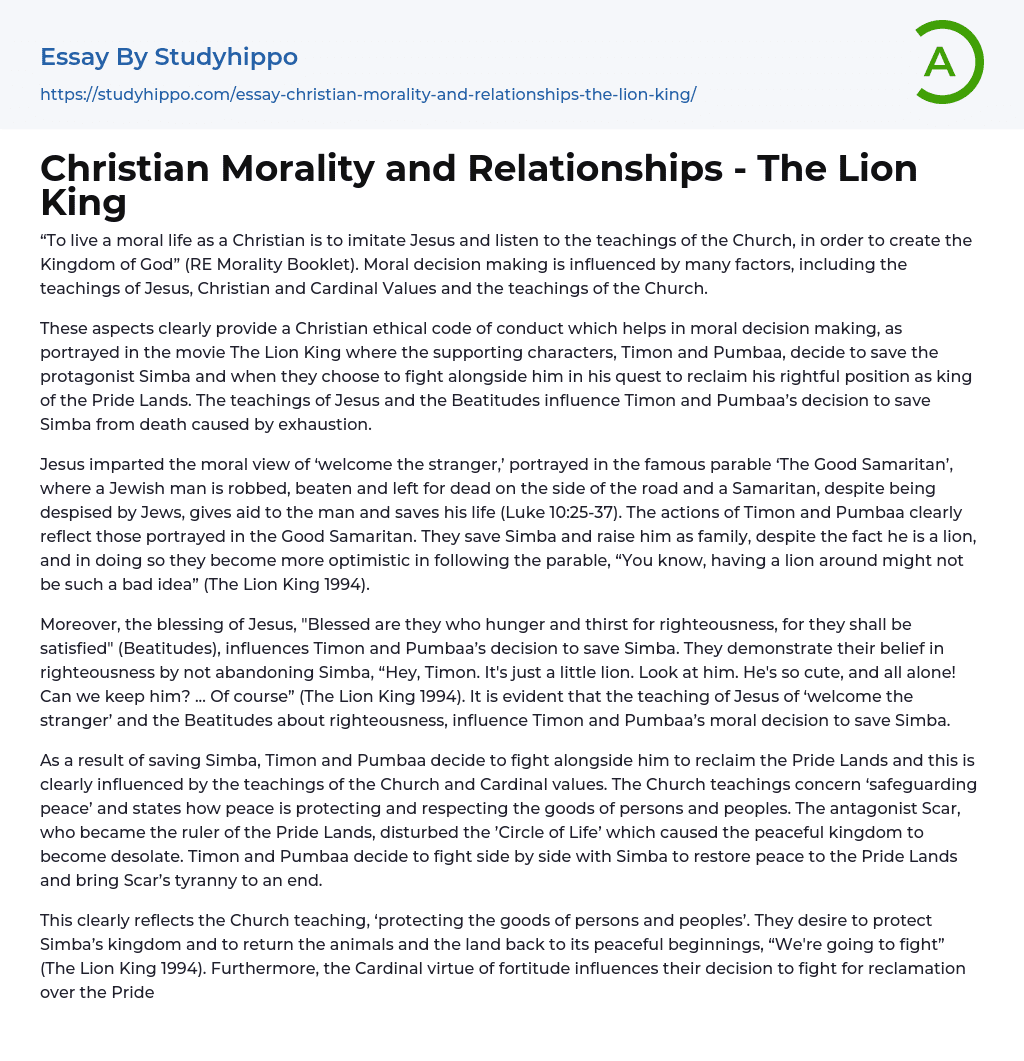

Christian Morality and Relationships – The Lion King Essay Example
“To live a moral life as a Christian is to imitate Jesus and listen to the teachings of the Church, in order to create the Kingdom of God” (RE Morality Booklet). Moral decision making is influenced by many factors, including the teachings of Jesus, Christian and Cardinal Values and the teachings of the Church.
These aspects clearly provide a Christian ethical code of conduct which helps in moral decision making, as portrayed in the movie The Lion King where the supporting characters, Timon and Pumbaa, decide to save the protagonist Simba and when they choose to fight alongside him in his quest to reclaim his rightful position as king of the Pride Lands. The teachings of Jesus and the Beatitudes influence Timon and Pumbaa’s decision to save Simba from death caused by exhaustion.
...Jesus imparted the moral view of ‘welcome the stranger,’ portrayed in the famous parable ‘The Good Samaritan’, where a Jewish man is robbed, beaten and left for dead on the side of the road and a Samaritan, despite being despised by Jews, gives aid to the man and saves his life (Luke 10:25-37). The actions of Timon and Pumbaa clearly reflect those portrayed in the Good Samaritan. They save Simba and raise him as family, despite the fact he is a lion, and in doing so they become more optimistic in following the parable, “You know, having a lion around might not be such a bad idea” (The Lion King 1994).
Moreover, the blessing of Jesus, "Blessed are they who hunger and thirst for righteousness, for they shall be satisfied" (Beatitudes), influences Timon and Pumbaa’s decision t
save Simba. They demonstrate their belief in righteousness by not abandoning Simba, “Hey, Timon. It's just a little lion. Look at him. He's so cute, and all alone! Can we keep him? ... Of course” (The Lion King 1994). It is evident that the teaching of Jesus of ‘welcome the stranger’ and the Beatitudes about righteousness, influence Timon and Pumbaa’s moral decision to save Simba.
As a result of saving Simba, Timon and Pumbaa decide to fight alongside him to reclaim the Pride Lands and this is clearly influenced by the teachings of the Church and Cardinal values. The Church teachings concern ‘safeguarding peace’ and states how peace is protecting and respecting the goods of persons and peoples. The antagonist Scar, who became the ruler of the Pride Lands, disturbed the ’Circle of Life’ which caused the peaceful kingdom to become desolate. Timon and Pumbaa decide to fight side by side with Simba to restore peace to the Pride Lands and bring Scar’s tyranny to an end.
This clearly reflects the Church teaching, ‘protecting the goods of persons and peoples’. They desire to protect Simba’s kingdom and to return the animals and the land back to its peaceful beginnings, “We're going to fight” (The Lion King 1994). Furthermore, the Cardinal virtue of fortitude influences their decision to fight for reclamation over the Pride Lands. Fortitude is the moral virtue that ensures firmness in difficulties and constancy in the pursuit of the good (Church Teachings).
It strengthens the resolve as followed in Psalms, "The Lord is my strength and my song; he has become my salvation "(Psalms 118: 14). Timon and Pumbaa use
their strength, powered by their belief in Simba, to pursuit good and fight alongside him, “Well, Simba, if it’s important to you, we’re with you to the end” (The Lion King 1994). It is clear that the teachings of the Church about protecting peace and the Cardinal virtue of fortitude, influence Timon and Pumbaa’s moral decision to fight for the Pride Lands and for Simba.
Therefore, moral decision making in The Lion King is clearly influenced by the teachings of Jesus, Christian and Cardinal values and the teachings of the Church. Timon and Pumbaa’s decision to save and fight for others is influenced by Jesus’ ‘welcome the stranger’ teaching, the Beatitudes about righteousness, the Church’s teaching of peace and the Cardinal value of fortitude. It is clear that Christian teachings and values influence moral decision making by providing an ethical code of conduct to follow, “Aim above morality. Be not simply good; be good for something” (Henry David Thoreau).
- Baptism essays
- Holy Spirit essays
- Jesus Christ essays
- Adam And Eve essays
- Crucifixion Of Jesus essays
- Crusades essays
- Eucharist essays
- God The Father essays
- Pope essays
- Protestantism essays
- Christian essays
- Church essays
- Elizabeth essays
- Sacrament essays
- Catholic Church essays
- Lord essays
- Priest essays
- Protestant Reformation essays
- Appreciation essays
- Afterlife essays
- Atheism essays
- Bible essays
- Buddhism essays
- Christian Worldview essays
- Christianity essays
- Confession essays
- Cosmological Argument essays
- Deism essays
- Devil essays
- Existence of God essays
- Faith essays
- Freedom Of Religion essays
- God essays
- Hinduism essays
- Immortality essays
- Islam essays
- Jainism essays
- Jews essays
- Judaism essays
- Miracle essays
- Monk essays
- Monotheism essays
- New Testament essays
- Old Testament essays
- Pilgrimage essays
- Puritans essays
- Revelation essays
- Ritual essays
- Salvation essays
- Sin essays



